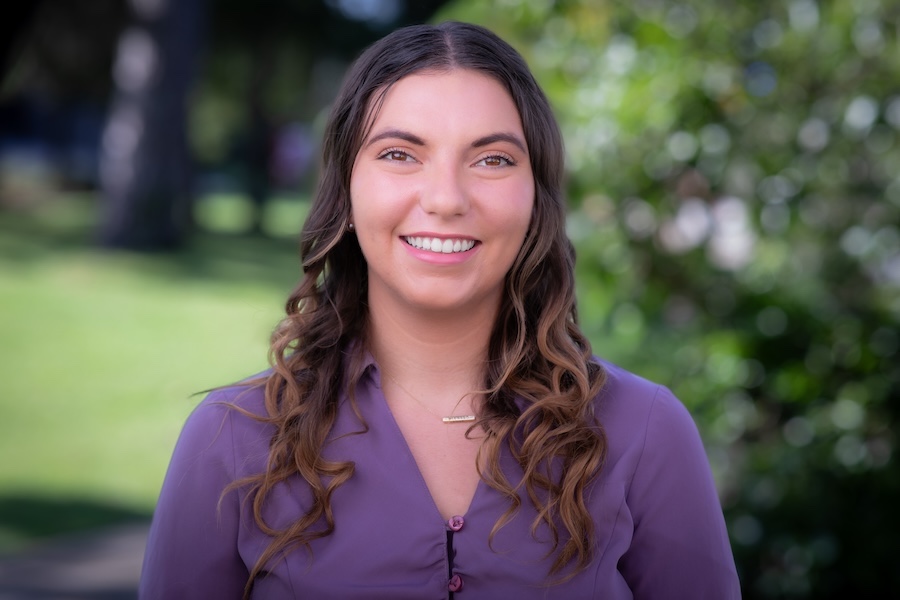Student Spotlight: Isabella Eaton

Isabella Eaton is a senior pursuing a degree in biological science from Florida State University's Department of Biological Science, part of the College of Arts and Sciences. Eaton was among 30 first-year students selected in 2021 for the Presidential Scholars Program, FSU’s preeminent undergraduate merit scholarship that invests in undergraduate students with potential to be the transformational leaders of their generation and supports them financially. Through the Undergraduate Research Opportunity Program, Eaton conducted research on NOX proteins, which play a key role in many biological processes, and their correlation with Type 2 diabetes. In addition to her roles as executive director and co-founder of the Disabled Student Union, Eaton has worked as a certified clinical medical assistant at the Health and Wellness Integrated Healthcare Centers in Tallahassee. She plans to graduate in Spring 2025.
Tell us a little about your background and what brought you to FSU.
I grew up in Orlando, but my family is originally from the U.K. Growing up in a hard-working immigrant family, I knew college was in the cards, but neither my family nor I knew how to get there. After touring FSU and receiving the offer to be a Presidential Scholar, I felt valued and like I could make a home here. I honestly could not see myself anywhere else.
What inspired you to pursue a degree in biological science?
Coming into college, my initial goal was to become a physician. Still, I chose to keep my options open by pursuing biological science, which is popular for pre-med students but not so specialized that it would potentially limit my options later.
Can you break down your areas of research for us?
I worked in the Hickner Research Lab, led by Robert Hickner, the Linda Grizzard Owens Professor in FSU’s Anne Spencer Daves College of Education, Health, and Human Sciences. In the lab, I studied the correlation between NOX proteins and Type 2 diabetes. NOX proteins produce harmful molecules called reactive oxygen species, or ROS, which can damage blood vessels. In healthy blood vessels, an enzyme called eNOS helps regulate blood flow. However, in conditions like Type 2 diabetes and cardiovascular disease, NOX proteins overproduce ROS, which disrupt eNOS and cause blood vessel dysfunction. This makes NOX proteins a critical link between Type 2 diabetes and heart-related problems.
Our research aims to describe the standard, healthy physiological mechanisms involved in endothelial function — the layer of cells that lines blood vessels and helps them contract and relax — and highlight the central role of NOX proteins in mediating endothelial dysfunction when glucose balance is impaired. In the lab, I also assisted in administering exercise fitness tests and sampling eligible participants for various studies.
What do you want the public to know about the importance of your research?
My research is highly relevant to the public because it focuses on understanding the biological mechanisms that contribute to Type 2 diabetes and cardiovascular disease — two of the most prevalent and costly health issues worldwide. Understanding these mechanisms is vital for developing targeted interventions to address future health issues.
How has being a Presidential Scholar aided your research?
The Presidential Scholars Program opened my eyes to UROP, and both programs exposed me to many interesting research topics and supported my later interest in the Hickner Research Lab.
Tell us about your experience as the executive director and co-founder of the Disabled Student Union.
DSU advocates for an increasingly accessible campus and was created to support FSU’s disabled community, as college is often the first time an individual with disabilities is without their support system. As an individual with disabilities, I know it can be isolating, but my team and I are working to alleviate the stigma that surrounds individuals with disabilities and help create an on-campus community, emphasizing unity and equality for our often-forgotten minority group. Once you start to look at the world around you through a lens of accessibility, you realize how inaccessible elements of everyday life can be.
Tell us about your work at the Health and Wellness Integrated Healthcare Centers.
Early last year, I took on an internship role with HWIHC led by Dr. Yvette Mignon, an internal medicine specialist and pediatrician in Tallahassee, which helped me become a certified clinical medical assistant. As a CCMA, I work directly with patients and support physicians and nurses by performing clinical tasks such as taking patient histories, collecting vitals, drawing blood, and assisting with minor procedures.
What aspect of your studies do you find most rewarding?
Through the funding of the Presidential Scholars Program, I traveled to Cusco, Peru, and Bali, Indonesia, to participate in public health volunteer opportunities. In Cusco, I worked as a medical assistant in a small remote village. While in Bali, I educated children in rural primary schools on the human body and hygiene. Working with underserved populations has been incredibly fulfilling and helped me realize my passion for providing care and addressing global health challenges. This experience has deepened my empathy, broadened my understanding of health-care disparities and enhanced my adaptability.
Are there any faculty or staff who have helped or inspired you?
Amber Wagner, director of the Office of Accessibility Services, has consistently supported me and DSU. Wagner emphasized that while OAS helps with students’ classes and educational accommodations, students also need a community with a peer support system. Because of her, DSU has become more than just a passion project and is truly starting to create real change.
Even though you might miss FSU, what are you looking forward to once you graduate?
I am most definitely going to miss FSU, but I plan on attending medical school with the career goal of becoming a physician working in foreign, underserved communities. Health care is not a privilege; it is a right. I want to help bring health equity to the world one community at a time.
